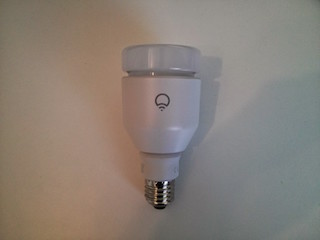This page is part of archived documentation for openHAB 3.0. Go to the current stable version
# LIFX Binding

This binding integrates the LIFX LED Lights (opens new window). All LIFX lights are directly connected to the WLAN and the binding communicates with them over a UDP protocol.

# Supported Things
The following table lists the thing types of the supported LIFX devices:
| Device Type | Thing Type |
|---|---|
| Original 1000 | colorlight |
| Color 650 | colorlight |
| Color 1000 | colorlight |
| Color 1000 BR30 | colorlight |
| LIFX A19 | colorlight |
| LIFX BR30 | colorlight |
| LIFX Candle | colorlight |
| LIFX Downlight | colorlight |
| LIFX GU10 | colorlight |
| LIFX Mini Color | colorlight |
| LIFX+ A19 | colorirlight |
| LIFX+ BR30 | colorirlight |
| LIFX Beam | colormzlight |
| LIFX Z | colormzlight |
| LIFX Tile | tilelight |
| White 800 (Low Voltage) | whitelight |
| White 800 (High Voltage) | whitelight |
| White 900 BR30 (Low Voltage) | whitelight |
| LIFX Candle Warm to White | whitelight |
| LIFX Filament | whitelight |
| LIFX Mini Day and Dusk | whitelight |
| LIFX Mini White | whitelight |
The thing type determines the capability of a device and with that the possible ways of interacting with it. The following matrix lists the capabilities (channels) for each type:
| Thing Type | On/Off | Brightness | Color | Color Zone | Color Temperature | Color Temperature Zone | Infrared | Tile Effects |
|---|---|---|---|---|---|---|---|---|
| colorlight | X | X | X | |||||
| colorirlight | X | X | X | X | ||||
| colormzlight | X | X | X | X | X | |||
| tilelight | X | X | X | X | X | |||
| whitelight | X | X | X |
# Discovery
The binding is able to auto-discover all lights in a network over the LIFX UDP protocol. Therefore all lights must be turned on.
Note: To get the binding working, all lights must be added to the WLAN network first with the help of the LIFX smart phone applications (opens new window). The binding is NOT able to add or detect lights outside the network.
# Thing Configuration
Each light needs a Device ID or Host as a configuration parameter. The device ID is printed as a serial number on the light and can also be found within the native LIFX Android or iOS application. But usually the discovery works quite reliably, so that a manual configuration is not needed.
However, in the thing file, a manual configuration looks e.g. like
Thing lifx:colorlight:living [ deviceId="D073D5A1A1A1", fadetime=200 ]
The fadetime is an optional thing configuration parameter which configures the time to fade to a new color value (in ms). When the fadetime is not configured, the binding uses 300ms as default.
You can optionally also configure a fixed Host or IP address when lights are in a different subnet and are not discovered.
Thing lifx:colorirlight:porch [ host="10.120.130.4", fadetime=0 ]
# Channels
All devices support some of the following channels:
| Channel Type ID | Item Type | Description | Thing Types |
|---|---|---|---|
| brightness | Dimmer | This channel supports adjusting the brightness value. | whitelight |
| color | Color | This channel supports full color control with hue, saturation and brightness values. | colorlight, colorirlight, colormzlight, tile |
| colorzone | Color | This channel supports full zone color control with hue, saturation and brightness values. | colormzlight |
| effect | String | This channel represents a type of light effect (e.g. for tile light: off, morph, flame) | tilelight |
| infrared | Dimmer | This channel supports adjusting the infrared value. Note: IR capable lights only activate their infrared LEDs when the brightness drops below a certain level. | colorirlight |
| signalstrength | Number | This channel represents signal strength with values 0, 1, 2, 3 or 4; 0 being worst strength and 4 being best strength. | colorlight, colorirlight, colormzlight, whitelight, tile |
| temperature | Dimmer | This channel supports adjusting the color temperature from cold (0%) to warm (100%). | colorlight, colorirlight, colormzlight, whitelight, tile |
| temperaturezone | Dimmer | This channel supports adjusting the zone color temperature from cold (0%) to warm (100%). | colormzlight |
The color and brightness channels have a "Power on brightness" configuration option that is used to determine the brightness when a light is switched on. When it is left empty, the brightness of a light remains unchanged when a light is switched on or off.
The color channels have a "Power on color" configuration option that is used to determine the hue, saturation, brightness levels when a light is switched on. When it is left empty, the color of a light remains unchanged when a light is switched on or off. Configuration options contains 3 comma separated values, where first value is hue (0-360), second saturation (0-100) and third brightness (0-100). If both "Power on brightness" and "Power on color" configuration options are defined, "Power on brightness" option overrides the brightness level defined on the "Power on color" configuration option.
The temperature channels have a "Power on temperature" configuration option that is used to determine the color temperature when a light is switched on. When it is left empty, the color temperature of a light remains unchanged when a light is switched on or off.
MultiZone lights (colormzlight) have serveral channels (e.g. colorzone0, temperaturezone0, etc.) that allow for controlling specific zones of the light. Changing the color and temperature channels will update the states of all zones. The color and temperature channels of MultiZone lights always return the same state as colorzone0, temperaturezone0.
LIFX Tile (tilelight) supports special tile effects: morph and flame. These effects are predefined to their appearance using LIFX application. Each effect has a separate speed configurable.
# Full Example
In this example living is a Color 1000 light that has a colorlight thing type which supports color and temperature channels.
The porch light is a LIFX+ BR30 that has a colorirlight thing type which supports color, temperature and infrared channels.
The ceiling light is a LIFX Z with 2 strips (16 zones) that has a colormzlight thing type which supports color, colorzone, temperature and temperaturezone channels.
Finally, kitchen is a White 800 (Low Voltage) light that has a whitelight thing type which supports brightness and temperature channels.
Either create a single Color item linked to the color channel and define Switch, Slider and Colorpicker entries with this item in the sitemap. Or create items for each type (Color, Switch, Dimmer) and define the correspondent entries in the sitemap.
# demo.things:
Thing lifx:colorlight:living [ deviceId="D073D5A1A1A1" ]
Thing lifx:colorlight:living2 [ deviceId="D073D5A2A2A2" ] {
Channels:
Type color : color [ powerOnBrightness=50 ]
}
Thing lifx:colorirlight:porch [ deviceId="D073D5B2B2B2", host="10.120.130.4", fadetime=0 ] {
Channels:
Type color : color [ powerOnBrightness=75 ]
}
Thing lifx:colorirlight:porch [ deviceId="D073D5B2B2B2", host="10.120.130.4", fadetime=0 ] {
Channels:
Type temperature : temperature [ powerOnTemperature=20 ]
}
Thing lifx:colorirlight:porch [ deviceId="D073D5B2B2B2", host="10.120.130.4", fadetime=0 ] {
Channels:
Type color : color [ powerOnColor="120,100,50" ] // Deep green, 50% brightness
}
Thing lifx:colormzlight:ceiling [ host="10.120.130.5" ]
Thing lifx:whitelight:kitchen [ deviceId="D073D5D4D4D4", fadetime=150 ]
# demo.items:
// Living
Color Living_Color { channel="lifx:colorlight:living:color" }
Dimmer Living_Temperature { channel="lifx:colorlight:living:temperature" }
// Living2 (alternative approach)
Color Living2_Color { channel="lifx:colorlight:living2:color" }
Switch Living2_Switch { channel="lifx:colorlight:living2:color" }
Dimmer Living2_Dimmer { channel="lifx:colorlight:living2:color" }
Dimmer Living2_Temperature { channel="lifx:colorlight:living2:temperature" }
// Porch
Color Porch_Color { channel="lifx:colorirlight:porch:color" }
Dimmer Porch_Infrared { channel="lifx:colorirlight:porch:infrared" }
Dimmer Porch_Temperature { channel="lifx:colorirlight:porch:temperature" }
Number Porch_Signal_Strength { channel="lifx:colorirlight:porch:signalstrength" }
// Ceiling
Color Ceiling_Color { channel="lifx:colormzlight:ceiling:color" }
Dimmer Ceiling_Temperature { channel="lifx:colormzlight:ceiling:temperature" }
Color Ceiling_Color_Zone_0 { channel="lifx:colormzlight:ceiling:colorzone0" }
Dimmer Ceiling_Temperature_Zone_0 { channel="lifx:colormzlight:ceiling:temperaturezone0" }
Color Ceiling_Color_Zone_15 { channel="lifx:colormzlight:ceiling:colorzone15" }
Dimmer Ceiling_Temperature_Zone_15 { channel="lifx:colormzlight:ceiling:temperaturezone15" }
// Kitchen
Switch Kitchen_Toggle { channel="lifx:whitelight:kichen:brightness" }
Dimmer Kitchen_Brightness { channel="lifx:whitelight:kitchen:brightness" }
Dimmer Kitchen_Temperature { channel="lifx:whitelight:kitchen:temperature" }
# demo.sitemap:
sitemap demo label="Main Menu"
{
Frame label="Living" {
Switch item=Living_Color
Slider item=Living_Color
Colorpicker item=Living_Color
Slider item=Living_Temperature
}
Frame label="Living2" {
Switch item=Living2_Toggle
Slider item=Living2_Dimmer
Colorpicker item=Living2_Color
Slider item=Living2_Temperature
}
Frame label="Porch" {
Switch item=Porch_Color
Slider item=Porch_Color
Colorpicker item=Porch_Color
Slider item=Porch_Temperature
Slider item=Porch_Infrared
Text item=Porch_Signal_Strength
}
Frame label="Ceiling" {
Switch item=Ceiling_Color
Slider item=Ceiling_Color
Colorpicker item=Ceiling_Color
Slider item=Ceiling_Temperature
Colorpicker item=Ceiling_Color_Zone_0
Slider item=Ceiling_Temperature_Zone_0
Colorpicker item=Ceiling_Color_Zone_15
Slider item=Ceiling_Temperature_Zone_15
}
Frame label="Kitchen" {
Switch item=Kitchen_Toggle
Slider item=Kitchen_Brightness
Slider item=Kitchen_Temperature
}
}
